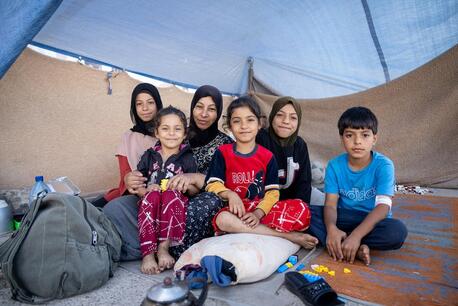UNICEF and Child Protection: Birth Registration as First Line of Defense of Children's Rights
How UNICEF has helped to increase birth registration rates in Chad — an essential component of child protection work — through digital innovation.
UNICEF supports tens of millions of birth registrations every year, reaching mothers of newborns as well as parents of older children who are without a birth certificate.
Why is this important?
"Without a birth certificate, you don’t exist legally," Felicite Tchibindat, Regional Director for UNICEF West and Central Africa until her retirement earlier this year, explained to UNICEF USA. "It makes it difficult to go to school, to access social benefits, including protection services. For UNICEF, the first thing we want to do is give every child a legal identity so they are recognized and they are counted. It is a first line of protection, a way to safeguard children’s rights. To have rights, you need to exist on paper."
Without a birth certificate, you don't exist legally ... To have rights, you need to exist on paper. — Felicite Tchibindat, former UNICEF West and Central Africa Regional Director
In many countries around the world where birth registration rates are low, UNICEF has long been working with governments to improve registration rates by easing the process, conducting catch-up campaigns with community volunteers and other methods.
Chad in particular has made great strides in birth registration thanks to a digital innovation called the Tasdjil app, which UNICEF helped implement in partnership with the Government of Chad. It requires no internet connection to function and the whole process takes less than 10 minutes.
More than 109,000 registrations have been completed through Tasdjil since the solution launched in 2022, according to the UNICEF Chad Country Office.
During a 2023 visit to a health facility in Chad, Tchibindat recalled one father's reaction to being handed his newborn child's birth certificate. "He was so amazed, because this was his fourth child, and he said that it was a big struggle to get the birth certificates for his other children," Tchibindat said.
"But this time, in less than an hour [after the baby was born], he has the document. This is a case of where we are bringing innovation to service delivery to address an issue that is so important."
UNICEF works in more than 190 countries and territories to create a more equitable world where every child is healthy, educated, protected and respected. Support UNICEF. Donate today.
HOW TO HELP
There are many ways to make a difference
War, famine, poverty, natural disasters — threats to the world's children keep coming. But UNICEF won't stop working to keep children healthy and safe.
UNICEF works in over 190 countries and territories — more places than any other children's organization. UNICEF has the world's largest humanitarian warehouse and, when disaster strikes, can get supplies almost anywhere within 72 hours. Constantly innovating, always advocating for a better world for children, UNICEF works to ensure that every child can grow up healthy, educated, protected and respected.
Would you like to help give all children the opportunity to reach their full potential? There are many ways to get involved.




